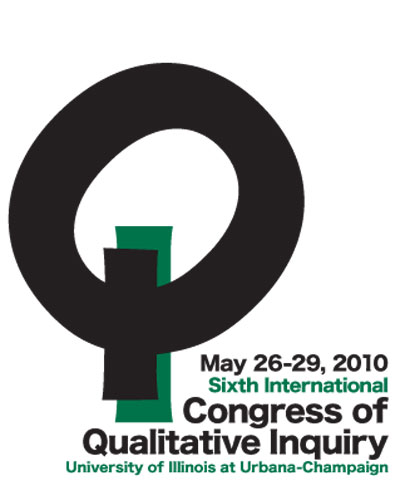As I liveblog sessions throughout the conferences I attend, including ICQI 2010 which I am attending right now, I thought it may be interesting to liveblog my own session as well.
This set of paper presentations is about autoethnographic methodology. The first people are presenting right now from a social work perspective. The stories are very engaging, though I am struggling to see the research methodology implicit in the session title thus far. The papers (which are being read; something which I will not do — I plan to read some sections, and otherwise discuss my work) are the authors’ stories, though they are somewhat indistinguishable from self-narrative. Completely engaging as I know something about the background content of the authors, nevertheless.
Interesting concept of the importance of being able to relate with clients with whom the author worked in the area of recovery and dependency issues. Developing the skills of using the self as a tool to work more effectively with clients.
Clients are always the true experts in their own lives. Interesting concept that the most important tool as a social worker to work with clients is the self. Good explanation of what patient self-management (though not mentioned) is all about.
Fascinating stories about social workers working in acute care settings, with the challenges involved in emergency room-related social work needs.
Amanda Latz from Ball State University is a methodological story that derives from her dissertation (that is just beginning). She considers doing one thing, and then finds it is developing somewhat differently.
Amanda started teaching in a community college, and while she did not have any initial plans or interests in doing her work there, she found she loved it. Her expectations were totally wrong. The people who she worked with there were quite diverse and very interesting. She felt people have many negative
She is planning to do a photo-voice project with her students, who are all community college learners. She wants to know about how community college students construct their lives. What motivates you to reach your educational goals? What are your best / worst experiences, how do you study, etc. The students would take photos and then gather together to discuss and explain the photos they tool and why.
She found there was a power imbalance, as she was instructor. She saw the power imbalance as getting in the way of her autoethnographic inquiry. She was really after community college student culture, and it evolved into a reflective ethnography. She wanted to help her students explore themselves through their stores.
The theorists she drew upon to help flatten the power imbalance and make
this a more authentic autoethnography were the educational work of
Freire (due to his flattening of education) and Bourdieu and his work
with class (since community colleges often have middle class instructors while they teach lower class students). However, while Amanda will not
engage in this herself — so she finally realized she is not planning
to do an autoethnography, she will do a highly reflexive ethnography.
She was later asked a question about the highly reflexive ethnography, and it
was shared that there is a chapter in the 3rd Handbook of Qualitative
Inquiry
I just presented. My work is about studying autoethnographic researchers themselves. Saw a few others in the room were typing on computers; I hope some of them were liveblogging my work or otherwise sharing my information. Goodness, the liveblogger may be liveblogged?!
I commented on my tongue-in-cheek doctoral thesis title — Researching the research of researchers. Hmm, have to think about this a bit more.
Alas, we kept all feedback until the end of the session. Too bad in some ways, but understandable given how short each of us here had (15 minutes, max).
Hilary Brown, who just defended her doctoral work (congrats!) is speaking now, where she discussed various vignettes. She worked with autoethnography and narrative inquiry from the Clandinan and Connelly work. She took various stories and then deconstructed them. She then went into the various theories to adult education theories
Hilary then mentioned her advisor’s “Know – Do – Be” model (what do I want my students to know, what do I want them to do, and what do I want them to be (more holistic). Really interesting model around educational research. She used this through the process of studying the stories of her working with students, and how they developed like rhizomes — with the concluding remark that stories beget stories.
She had a question about how her mothers (she had 2) who wrote a lot, and a theme through her work was how they influenced her and how she teaches.
Susan Bardy spoke about autoethnography as a way of analyzing data. She found it when she sought a methodology to study nursing practice. Her work was hospice work for 20 years. She has written stories of how she came to nursing, and then she willl try to make sense of her stories.
Susan just told a riveting story of how she watched her father die, many years ago, nearly alone and in pain. She determined then she would become a hospice nurse, as she
She engaged in 19 interviews with palliative care nurses, and this experience helped her understand the deep identity common to nursees in palliative care.
 I was unable to post this yesterday due to many work tasks in the morning, so continuing my #5Papers focus with this great methodological article today.
I was unable to post this yesterday due to many work tasks in the morning, so continuing my #5Papers focus with this great methodological article today.

